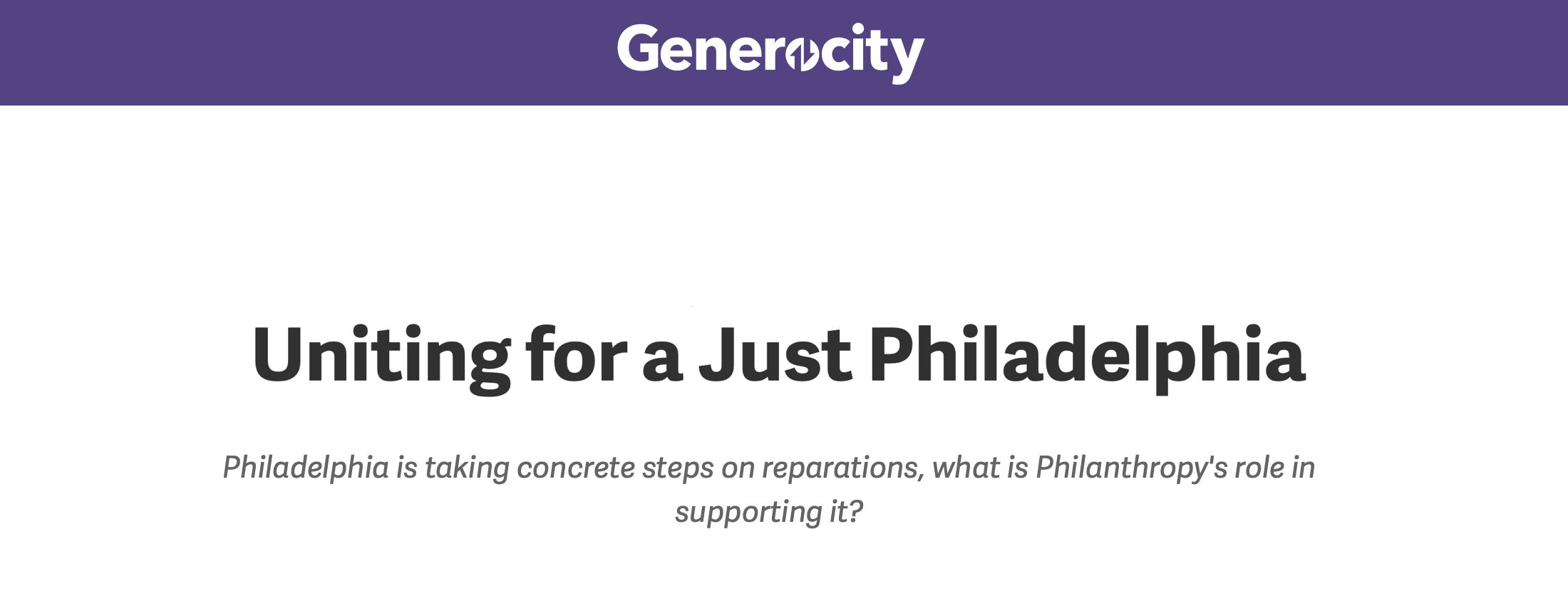Philadelphia is taking concrete steps on reparations, what is Philanthropy’s role in supporting it?
In recent times, the conversation surrounding reparations for Black Americans has gained significant momentum, and the city of Philadelphia is taking concrete steps to address historical injustices through the introduction of a resolution to form a task force on reparations. This effort is being led by the Philadelphia chapter of the National Coalition of Blacks for Reparations in America (N’COBRA PHL), Councilmember Jamie Gauthier, and Councilmember Kendra Brooks, this initiative aims to confront the lasting impacts of historical wrongs on the Black Community. As the city embraces this crucial process, the role of philanthropy becomes increasingly important in supporting the cause, fostering healing, and promoting equity in Philadelphia.
Reparations should never be seen as a mere handout; instead, it represents a rightful acknowledgment of the historical injustices perpetrated against the Black community. Advocates have outlined several areas that demand exploration by the Philadelphia Reparations Task Force, including underfunded schools, inadequate healthcare, food deserts, environmental racism, pollution and more. Addressing these issues requires a comprehensive understanding of the root causes of disparities, and reparations offer an opportunity to heal deep-seated wounds and rectify systemic injustices.
The involvement of philanthropic organizations and individuals in the pursuit of reparations is paramount. Erinn Corbett-Wright, Founder and Principal of Ethos Advisory, a Social Impact Solutions firm based in Philadelphia states:
“Philanthropy can act as an accelerant to help the government overcome limitations in leveraging funds for designing and piloting efforts like these. Additionally, philanthropy has an opportunity to acknowledge the benefits that foundations have received from wealth earned through the exploitation of Black labor over time. Meaningful contributions to pooled funds can support direct payments to affected families, facilitate research and development of effective strategies, and amplify efforts to drive national conversations around the influence of chattel slavery on America.”
Corbett-Wright, emphasizes the importance of pairing reparations efforts with other initiatives, such as those connected to the 250th anniversary of American independence.
“I am supportive of exploring how to intentionally redress the harms of enslavement for the descendants of those who had to persist within the subhuman conditions of chattel slavery. Given historical landmarks like The Johnson House, Philadelphia has long acknowledged its role and participation in slavery as well as the abolition movement but has yet to go far enough to take accountability for the local policies that made slavery possible.”
This pairing creates a comprehensive picture of America’s history and a genuine attempt to make amends for past actions and policies that perpetuated slavery. Breanna Moore & Rashaun Williams, of N’Cobra Philadelphia says Philanthropy can
“Financially contribute to the success of the Philadelphia Reparations Task Force to study and develop a Reparations Proposal for Black Philadelphian Descendants of Enslaved Africans in the United States by giving funding to support taskforce research and members. Foundations and Impact funds should look at the reparative capital they provide, which can help to study how Black Americans have been targeted and exploited through redlining, mortgages, gentrification, business and personal loans, housing programs, environmental racism and brown zones, private prison funding, inadequate funding for public school education, exclusion from and exploitation in post-secondary education programming, and much more.”
There is a call to action for Philanthropy to tangibly invest and support the fight for reparations. They can support by:
✓ Supporting Grassroots Initiatives: Collaborating with grassroots organizations empowers Black communities by funding initiatives that address their unique challenges and needs.
✓ Invest in Education: Philanthropy can support educational programs that raise awareness and understanding of the historical context behind reparations, fostering informed discussions and public support.
✓ Facilitate Dialogue: Creating safe spaces for dialogue and collaboration among stakeholders promotes understanding and unity in the pursuit of reparative justice.
✓ Ensure Accountability: Philanthropic organizations can back independent audits and investigations to ensure businesses comply with slavery disclosure laws and take responsibility for past wrongs.
To build public support for reparations, philanthropy can invest in education and historical awareness campaigns. By disseminating accurate information, misconceptions can be addressed and a united front for reparative justice can be forged.
Philadelphia, with its rich history of abolitionism, must also confront its role in perpetuating slavery and profiting from the exploitation of Black people. Philanthropy’s acknowledgment of this historical reality can foster honest and open conversations about reparations, leading to a collective sense of responsibility and empathy. The resolution to establish a task force on reparations for Black Philadelphians is a vital step towards rectifying historical injustices and creating a more equitable Philadelphia.
Philanthropic support is critical to ensure the success of this endeavor, from funding the task force to promoting education and dialogue. By embracing reparations as a means of healing, unity, and acknowledging the debt owed to the Black community for centuries of injustice, Philadelphia can pave the way for a fair and just future.
By Jasmine Sessoms
